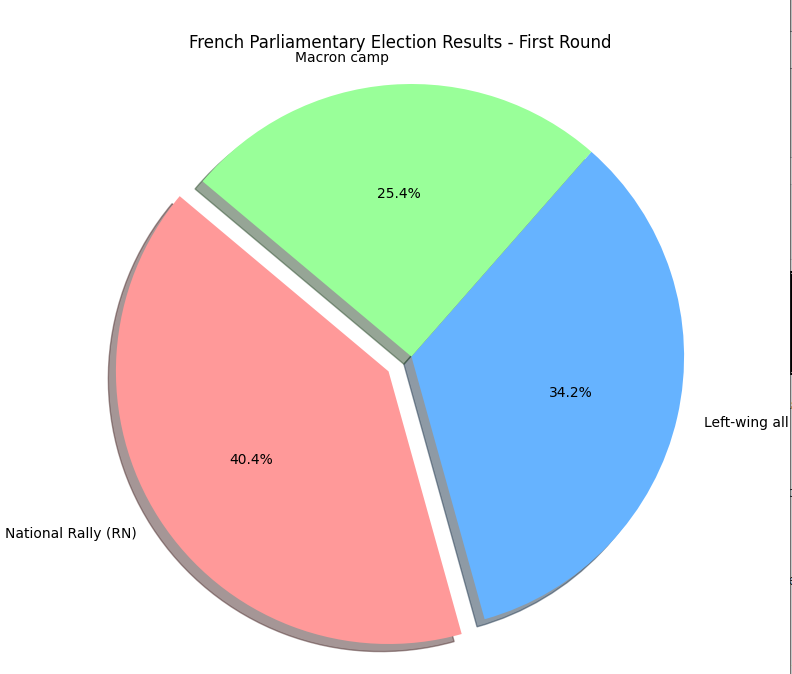| Listen to our audio presentation: History of the US Supreme Court |
France’s far-right party, National Rally (RN), has taken the lead in the first round of parliamentary elections, signaling a significant shift in the country’s political landscape. This victory has brought the RN, led by Marine Le Pen and Jordan Bardella, closer to an unprecedented position of power.
Election Results
In the initial round of voting, the RN secured 33.1% of the vote, outpacing the left-wing alliance, which garnered 28%, and President Emmanuel Macron’s centrist bloc, which managed only 20.76%. The outcome has been celebrated by RN supporters, with Le Pen declaring the near obliteration of the “Macronist bloc”.
Historic Milestone
This marks the first time the far right has led in a French parliamentary election, an event described as historic by political commentator Alain Duhamel. The RN’s rise reflects a significant shift in French politics, with increasing support for its anti-immigration stance and nationalist policies.
Leadership and Future Prospects
Jordan Bardella, the 28-year-old leader of RN, expressed his ambition to become the prime minister for all French citizens, contingent on securing enough votes. The party is now aiming for an absolute majority of 289 seats in the 577-seat National Assembly.
Challenges Ahead
Despite their current lead, seat projections for the upcoming second round of run-off votes indicate that RN may struggle to achieve an outright majority. The final outcome will be crucial in determining the extent of their influence in the French government.
The French parliamentary elections, also known as the legislative elections, are crucial in determining the composition of the National Assembly, the lower house of France’s bicameral Parliament. These elections occur every five years and are pivotal in shaping the country’s legislative agenda and overall political direction.
Key Points about the French Parliamentary Elections
- Structure and Process:
- The National Assembly has 577 seats, each representing a constituency.
- Elections are held in two rounds. If no candidate achieves more than 50% of the vote in the first round, a second round is held.
- The second round includes candidates who received at least 12.5% of the votes in the first round, and the candidate with the most votes in this round wins the seat.
- Current Context:
- In the latest election, the far-right National Rally (RN), led by Marine Le Pen and Jordan Bardella, secured 33.1% of the vote in the first round.
- The left-wing alliance came in second with 28% of the vote, and President Emmanuel Macron’s centrist bloc followed with 20.76%.
- This marks a historic moment as it is the first time the far-right has led in a French parliamentary election.
- Significance of Results:
- The outcome of these elections is significant because it determines the legislative power balance.
- Marine Le Pen and Jordan Bardella aim to secure an absolute majority of 289 seats in the National Assembly, which would enable them to implement their policies more effectively.
- The RN’s rise reflects growing support for their anti-immigration and nationalist policies among French voters.
- Challenges Ahead:
- Despite their strong showing in the first round, projections suggest that the RN may struggle to achieve an outright majority in the second round.
- The final results will determine whether the RN can form a government or if they will need to seek coalitions with other parties.
Historical Context
The French political landscape has traditionally been dominated by centrist and left-wing parties. The rise of the far-right National Rally signifies a shift in voter sentiment and increasing polarization within French society. This shift has been attributed to various factors, including economic challenges, immigration issues, and dissatisfaction with traditional political elites.
Implications
The results of the French parliamentary elections will have far-reaching implications for France’s domestic policies and its role in the European Union. A strong far-right presence in the National Assembly could lead to significant changes in immigration policy, economic reform, and France’s stance on EU matters.
Overall, the French parliamentary elections are a critical event that shapes the country’s political, economic, and social future. The performance of the National Rally in the first round is a testament to the changing dynamics of French politics. The upcoming second round will be decisive in determining the extent of their influence.
Resources
CNN: “France’s far right celebrates lead and seeks majority”
BBC News: Paul Kirby’s report from Paris

